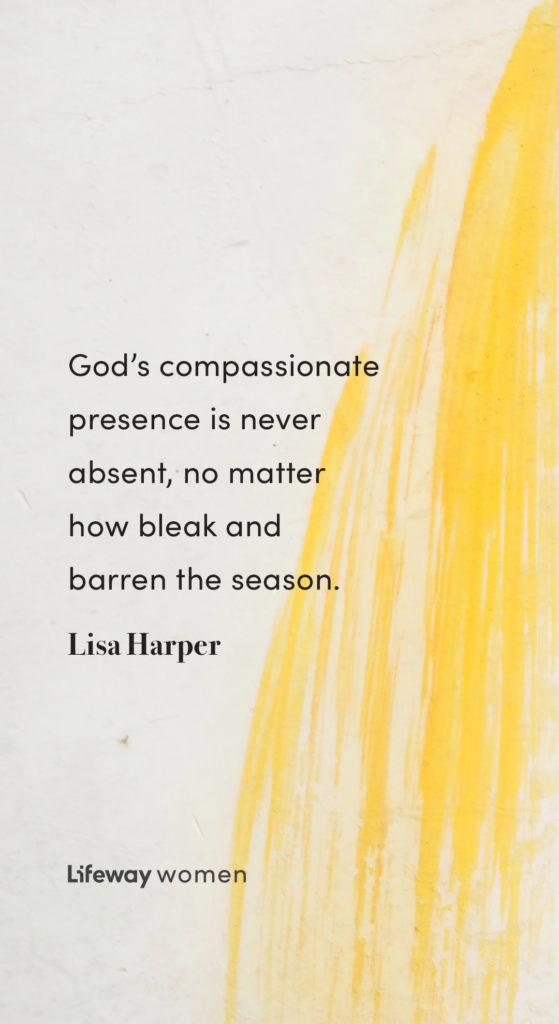Today we’re sharing an excerpt from Lisa Harper’s new study, How Much More. Order your copy or see a free sample today at lifeway.com/howmuchmore. Plus, mark your calendar for June 30 at 7 p.m. CT, when we’ll be hosting a video premiere of Lisa’s session 1 teaching session on the Lifeway Women YouTube!
I’ve often teased my counselor, Lynn, about being her job security. She has been such a means of grace that I can’t imagine navigating some of the more difficult seasons and relationships in my life without her. She’s shared a plethora of wisdom with me over the years, and, because my heart often lags behind my head, she kindly puts much of it in analogous form so I’m not tempted to overanalyze it and miss the main point. One of my favorite analogies from her reframed my view of change. I was in the middle of trying to reform some really unhealthy behaviors I’d foolishly repeated in several friendships and dating relationships, and my attempts weren’t being well received, especially by a few dear long-term friends. When I described the pushback and resistance I was getting, Lynn said that changing ingrained patterns—even unhealthy or sinful ones—was much like changing a dance style in the middle of a song. For instance, “dance partners” (i.e., friends, family members, a spouse, and so forth) get used to our particular “relational choreography,” so changing our steps from a waltz to a foxtrot smack-dab in the middle of a routine they have memorized totally throws them off-balance. It takes a lot of time and effort to learn a new dance style, and some would rather not go through that awkward, toe-crushing season when they already have another routine down pat, even if it’s unhealthy.
I couldn’t help but think of that analogy when I was in the early stages of praying about and planning for this project. For many of us, understanding how much more God loves us and is actively working on our behalf is going to require changing some presumptions we have about Scripture, as well as changing some of the steps we’ve grown accustomed to when it comes to engaging the biblical text. This new dance might get a little uncomfortable. We might break out into a sweat, and we’ll probably get our toes stepped on a time or two, but it will be so very worth it in the end. Through the guidance of God’s Spirit and the revelation of His Word, I believe we’ll have increased security in His love, increased desire to know and commune with Him through Scripture, and increased passion to share the living hope of Jesus Christ in tangible ways in order to help redeem the world around us.
So here’s the new four-step pattern we’re going to practice together:
Stretching Sacred Muscles
Learning Redemptive Rhythms
Following God’s Lead
Dancing For Good
And to help these four steps sink in, we’re going to connect them with four spiritual disciplines. If you’re an Enneagram One, someone who prefers routine, or are simply used to Bible studies with prescribed daily “homework” sections, please feel free to complete one of these disciplines per day of the week. Since there are four sections instead of five, you’ll have one whole weekday left over for review! But if you’re more like me and typically don’t have the same schedule each week, then complete these sections/spiritual dance steps as you have time. Frankly, some of my best Bible study moments are when the rest of my house is asleep. Here’s how we’re going to get into the how much more flow:
STRETCHING SACRED MUSCLES will help us peruse God’s Word. The definition of peruse is “to examine or consider with attention and in detail.”
STRETCHING SACRED MUSCLES will help us peruse God’s Word. The definition of peruse is “to examine or consider with attention and in detail.”1 Acts 17:11 says the Bereans “received the word with eagerness and examined the Scriptures daily to see if these things were so.” Just like those ancient Bereans, we want to dig into God’s promises to get a better understanding of who we are as His beloveds and how to lean more fully into an intimate relationship with Him.
LEARNING REDEMPTIVE RHYTHMS will help us pause to ponder what we’ve read and examined. Well-seasoned (pun intended) barbecue chefs—or “pit masters”—say that the tastiest, tenderest meat has been allowed to marinate for a long time. So it is with followers of Christ. It takes a while for the truth of God’s Word to permeate our hearts and tenderize those places where the difficulties and disappointments of life have built up callouses of skepticism or self-protection. Dutifully studying the Bible, in and of itself, doesn’t necessarily equate with delighting in God, much less resting in His delight for us. Taking the time to really marinate in the awesome truths revealed in Scripture is what pays the highest spiritual dividends. As the psalmist wrote, “How happy is the one” whose “delight is in the LORD’s instruction, and he meditates on it day and night” (Ps. 1:1,2).
FOLLOWING GOD’S LEAD will help us establish the habit of both praying about what we’re learning and praying God’s promises deeper into our hearts. From the beginning of biblical history, it’s clear that God wanted an intimate relationship with us, not some superficial transactional relationship where we just ask Him for stuff and He gives it to us based on merit or whim. We don’t have to walk around afraid that He’s going to whack us over the head when we misbehave, make a wrong choice, or say a word that’s not in the Bible when we’re stuck in bad traffic (mind you, I’m simply hypothesizing at this point!). And the foundation of real, intimate relationships is good communication, which is surely why Paul encouraged the Colossians, “Devote yourselves to prayer; stay alert in it with thanksgiving” (Col. 4:2). And finally,
DANCING FOR GOOD will help us put what we’re learning into PRAXIS, which may just sound like a fancy term for “practice,” yet there’s actually a significant difference between the two words. Unlike practice, which can describe rote behavior like practicing one’s multiplication tables or parallel parking skills, PRAXIS refers to an action in which there is inherent meaning that reflects the motive of one’s heart. (Watch for words marked like PRAXIS throughout the study. You’ll find more information on these words in our Weighty Words section at the end of each week.) The bottom line is, God calls us not to simply study His Word to increase our head knowledge but to actually “flesh out” biblical truths in light of the transformation that has taken place in our hearts. As James encouraged Christians, “Be doers of the word and not hearers only” (Jas. 1:22a).
Of course, learning a new spiritual dance style is going to take a little time, y’all. So take a couple of deep breaths, freshen up your coffee (or electrolyte enhanced “smart” water for those of you super healthy gluten-free types who are surely clad in yoga pants), and let’s get started!
1. Merriam Webster, s.v. “peruse,” accessed February 22, 2021,
https://www.merriam-webster.com/dictionary/peruse.
Want to learn more about How Much More? Watch the short video below or view a free sample and teaching video clips at lifeway.com/howmuchmore.
And here are some fun wallpapers for your desktop and phone! Click the images below to download!







